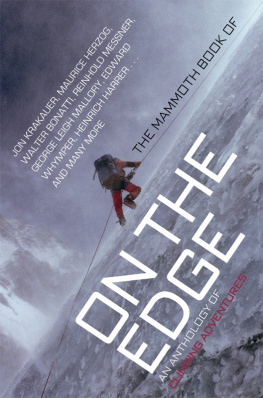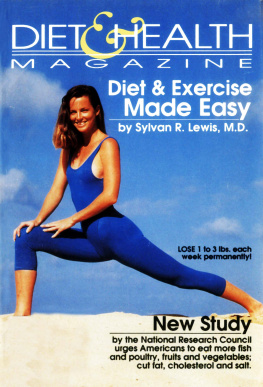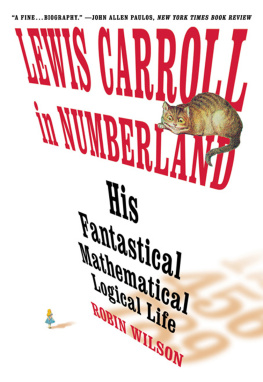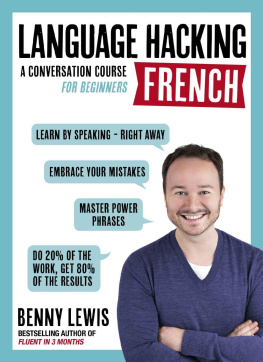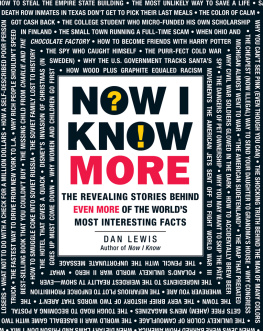For my parents, my brother and sister, and most of all for Art.
one
Los Angeles 2004.
One day, about a year ago, I felt myself coming completely undone, as if I were going off the rails. I developed strange allergies. I felt exhausted all the time, but couldnt sleep. And in the middle of the night, during those punishingly lucid hours, I would ask myself the same question: Is this it? Is this the life I meant myself to have? Because one thing was painfully obvious: if I hadnt accomplished nearly as much as Id set out to achieve some twenty, or even thirty years before, it was almost certain now, in my fifties, I never would. A frightening thought. It was no longer realistic to focus on my own potential, because everything that was going to happen had happened to me already. I didnt know what to do with these feelings of worthlessness. In the past, Id been able to ground myself in some kind of logic, to say, Push on, start again! Now I felt as if I were slipping backward over the edge of a ravine, abandoned not only by my old self but by that reliable standby, optimism .
I didnt mention this to anyone. How could I? After all, my life was privileged, enviable. I was living in Los Angeles, married to a successful man, the sun shone, nothing had changedexcept I couldnt get out of bed in the morning. Whats the matter? my husband asked repeatedly. Nothing, I said, on cue. Well, there must be something. Yes, there was. There was fear and rage. A lot of ragesuppressed, naturally, or indiscriminately directed at a stranger, some foot-dragging check-out girl at the market. The fear was more pervasive. There were nights driving back on Sunset Boulevard when confronted by a blaze of oncoming headlights, I was tempted to flip the wheel and embrace the end. Im done. Laughable, really. The self-pity. The drama. Not brave enough. And no, I did not really want to be erased.
What I wanted was freedom. I wanted part of myself back. Which part? Well, that was the quandary. The unsolvable question. Did I want my freedom enough to leave my husband? Did I want a divorce after almost twenty years? Was I paying too much emotionally for safety and understanding? How can you even love me like this? I would ask with exasperation, cowardly about what I obviously needed so badly. On the other hand, did I really want to be one of those aging single women taking late-night spinning classes or going on a scary sex date from Match.com ? The anonymous fuckthat longed-for nonemotional thrill. God help me. I tried to imagine it: standing next to some stranger in the elevator with the scary overhead lighting. Then the undressing, the getting naked part, the old skin. What Saul Bellow once described, referring to a woman of a certain age, as washed but not ironed. When exactly did that happen? Overnight, it seems. Ten years ago, I could still get a few morale-boosting looks from younger men. The kids at the gas station, California boys in surfing shorts and flip-flops, filling their beat-up coupes, would give me a stoners wink. Now its maam . Excuse me, maam, they say, looking a little scared. Well, I did look scary. Is it hormonal? my husband asks, with far more affection than I deserve. Possibly. Yes, of course it is. That and more. Some mysterious chemical imbalance, as yet unknown. To be discovered soon, I hope, along with a suitable drug to counteract the dread of aging, the burden of contemplation, of being invisible .
What is the definition of success anyway? And from whose point of view? Your familys, your competitorsor from an inflated idea of your own worth? Is ambition the great self-motivator, or is it just a constant solicitation for love?
Youve had a good career, my husband likes to say. Look what youve done.
Yes, Ive done a few things. Way back in the glorious 60s, I started out as a model and an actress. Those innocent days when men could jokingly refer to us hyphenates as mattresses and get away with it. What did we know? I starred in many moviesalbeit at the end as a horror heroine. I married the son of royalty, the Hollywood kind; I had affairs with famous men (is this still a career?), discarded them, not guiltlessly, but furiously, wanting more . I became a writer. I was a writer down to my bonesthat was real passion: journalism, screenplays, a book, but then something happened. Or rather, nothing happened. It was a slow decline, like health, like aging. I was semi-famous; I had been something, but as one worthy critic remarked: past laurels fade fast .
What to do? Years ago, I would simply get on a plane. Leave. Reinvent myself. Coming out of an airport into a strange city with its sharp smells and foreign voices, time was suspended, the inevitable postponed. But even that stopped working. Suddenly hotel rooms were too confining, the beds too hard, and like some invalid I had to travel with my own feather pillow. I also needed a balcony, to get out, or at least to keep sight of the horizon. And however beautiful the viewsome tree-lined avenue Id longed foras soon as I got there, I would start thinking about being somewhere else. No matter what city I landed in, I felt like a displaced person. In London I missed the weather in California, and in California I would start thinking about Franceor more specifically, the South of France of my childhood.
The truth is, after more than two decades living in America, I still feel like an alien. Youve been living in L.A. for half your life, my husband reminds me. I know. But Im English I say, as though Ive finally pinpointed my particularly crippling disease.
Try to be positive. Live in the present.
But I cant. Because I dont know what Im doing here anymore. All I can think about is the past.
two
England. The 1950s.
Uncle Mike, a debonair man from the old school who favored handmade shoes and the cardsharps mustache, once gave me some advice. Remember, he said, a woman has a choice in life. You can either spend it on your knees scrubbing the kitchen floor, or you can spend it lying on the deck of a yacht in the South of France. Yours to decide.
I was seven years old at the time, but something must have sunk in: a life beyond suburban England.
To be honest, for as long as I can remember, I wanted to escape. From danger, from boredomfrom myself mostly, though of course I didnt know it. In the early years this vague impulse was confined to my immediate area: the space under the stairs or the back of the airing cupboard where, curled up on a shelf against the boiler, I was lulled by the comforting smell of singed sheets. Certain places I claimed as my own. Our bathroom, for instance, with its black and green tiles and a black tub, deemed by one of my mothers friends as ultra modern, interested me no end. There were things, too, that I took possession of: my fathers medals, books with intriguing names like West with the Night, and a souvenir ashtray from Egypt in the shape of a camel. There was our solid oak front door with its outside striped awningportal to future adventure. And then, in the dining room, a pair of stained-glass windows I was particularly fascinated by, brilliantly lit up by the afternoon sun, and that merely a decade later struck me as horribly suburban. In warmer weather, there was the garden, our rectangle of grass bordered by brown fencing. Sometime in the early 50s, my father bought the plot next door from a tea merchant. An old orchard, it was a mysterious place with an abandoned greenhouse, espaliered peach trees, and mulberries. But there I went. At first, escape was not a concrete idea; it was more a nervous reaction to my being a nuisance. Housework consumed my mother. Cleanliness and order were her way of organizing life, to make it endurable. I recognized her struggle early onor at least I recognized that I alone of the children saw this; that, moreover, I contributed to it, and at the sound of the Hoover, that first disturbing roar, I fled outside.
Next page



